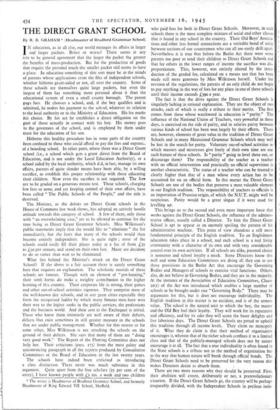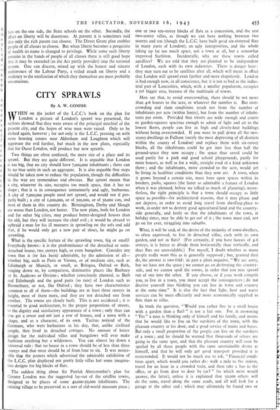THE DIRECT GRANT SCHOOL
By R. B. GRAHAM * (Headmaster of Bradford Grammar School)
T N education, as in all else, our world manages its affairs in larger I and larger packets. Better or worse? There seems at any rate to be general agreement that the larger the packet the greater the benefits of mass-production. But for the production of goods that require the personal touch the smaller packet still seems to have a place. In education something of this sort must be in the minds of parents whose applications cram the files of independent schools, whether hitherto grant-aided or not, all over the country. Some of these schools are themselves quite large packets, but even the largest of them has something more personal about it than the educational system of even a small county borough. The parent pays fees. He chooses a school, and, if the boy qualifies and is admitted, he makes his payment to the school, whatever its relation to the local authority or to the Ministry of Education. His fee marks his choice. By his act he establishes a direct obligation on the part of those actually in contact with his boy. His money goes to the governors of the school, and is employed by them under trust for the education of his son.
Hitherto this healthy procedure has in some parts of the country been confined to those who could afford to pay the fees and expensc., of a boarding school. In other parts, where there was a Direct Grant school (i.e., a school which gets a grant direct from the Board of Education, and is not under the Local Education Authority), or a school aided by the local authority, which d:d, in fact, manage its own affairs, parents of quite slender means have been able, by a willing sacrifice, to establish this proper relationship with those educating their children. Now even the sacrifice is not required. The fees are to be graded on a generous means test. These schools, charging low fees or none, and yet keeping control of their own affairs, have been called "The Public Schools of the People," and the title is deserved.
The Minister, as the debate on Direct Grant schools in the House of Commons last week shows, has adopted an actively hostile attitude towards this category of school. A few of them, only those with "an overwhelming case," are to be allowed to continue for the time being as Direct Grant Grammar Schools. Miss Wilkinson's public statements imply that she would like to " eliminate " the list immediately, but she fears that many of the schools would then become entirely independent. She is quite right ; most of the schools could easily fill their places today at a fee of from £35 to £50 per annum, and stand on their own feet. Many are deciding to do so rather than wait to be eliminated.
What lies behind the Minister's attack on the Direct Grant School? If the above is a fair account there is surely something here that requires an explanation. The scholastic records of these schools are famous. Though with an element of "pot-hunting," their shah forms do make a weighty contribution to the higher learning of this country. Their corporate life is strong, their games and other out-of-school activities vigorous. They comprise most of the well-known day schools, and in our great cities especially they form the recognised ladder by which many famous men have won their way to the higher ranks in the public services, the professions and the business world. And their cost to the Exchequer is trivial. Those who know them intimately are well aware of their defects, defects that exist sometimes in still greater measure in the schools that are under public management. Whether for this reason or for some other, Miss Wilkinson is not attacking the schools on the ground of their defects. She says that many of them are "doing very good work." The Report of the Fleming Committee does not help her. Their criticisms (para. 173) form the most paltry and unconvincing paragraph in all the reports produced by Consultative Committees of the Board of Education in the last twenty years.
The schools have indeed been criticised as introducing a class distinction. There never was much substance in this argument. Quite apart from the free scholars (25 per cent. of the entry), I have known people with £3 los. a week and two children " The writer is Headmaster of Bradford Grammar School, and formerly Headmaster of King Edward VII School, Sheffield. who paid fees for both in-Direct Grant Schools. Moreover, in such schools there is the most complete mixture of social and other classes that is found in any school in the country. Their Old Boys' Associa- tions and other less formal connections are a veritable bond of unity between sections of our countrymen who can all too easily drift apart. Nevertheless it is true that before the Butler Act there were some parents too poor to send their children to Direct Grant Schools and that for others in the lower ranges of income the sacrifice was dis- proportionate. This, however, was entirely altered by the intro- duction of the graded fee, calculated on a means test that has been made still more generous by Miss Wilkinson herself. Under her revision of the regulations, the parents of an only child do not begin to pay anything in the way of fees for any place in one of these schools until their income exceeds £390 a year.
The fact is that the drive against the Direct Grant Schools is singularly lacking in rational explanation. They are the object of two attacks, each of which is really a tribute to their merits. The first comes from those whose watchword in education is "parity." The influence of the National Union of Teachers, very powerful in these days, is exercised on the side of parity, and in salaries parity between various kinds of school has been won largely by their efforts. There are, however, elements of great value in the tradition of Direct Grant Schools and in many Maintained Grammar Schools which may well be lost in the search for parity. Voluntary out-of-school activities to which masters and mistresses give freely of their own time are one such feature of these schools. Is " parity " going to level these out, or discourage them? The responsibility of the teacher as a teacher with no official intervention and practically no official supervision is another characteristic. The status of a teacher who can be trusted is clearly higher than that of a man whose every action has to be accounted for on an official form. In this matter the Direct Grant Schools are one of the bodies that preserve a most valuable element in our English tradition. The responsibility of teachers to officials is an importation of Prussian origin, of which the N.U.T. might well be suspicious. Parity would be a great slogan if it were used for levelling up.
This brings us to the second and even more important force that works against the Direct Grant Schools, the influence of the adminis- trative officer, usually called a Director. To him the Direct Grant School is apt to appear as an anomaly spoiling the pattern of his administrative machine. This point of view abandons a still more fundamental principle of the English tradition. To an Englishman education takes place in a school, and each school is a real living community with a character of its own and with very considerable control over its own activities. If all schools are alike, parental choice is nonsense and school loyalty a mock. Some Directors know this well and some Education Committees are doing all they can to use those provisions in the Butler Act that encourage the Governing Bodies and Managers of schools to exercise vital functions. Others, alas, do not believe in Governing Bodies, and they are in the majority. At the instance of the Association of Education Committees, Clause 20(1) of the Act was introduced which enables a large number of schools to be brought under one "Governing Body." There may be arguments for this, but it does' not encourage individuality. The English tradition in this matter is no accident, and is of the utmost value. The school is the natural unit to which the boy, the master and the Old Boy feel their loyalty. They will work for its reputation and efficiency, and for its sake they will scorn the baser delights and live laborious days. The Direct Grant Schools are proud to uphold this tradition through all income levels. They claim no monopoly of it. What they do claim is that their method of organisation encourages it, whereas that of the richer schools confines it to a limited class and that of the publicly-managed schools does not by nature encourage it at all. The fact that a true individuality is often found in the State schools is a tribute not to the method of organisation but to the way that human nature will break through official bonds. The Direct Grant Schools need to be preserved for the very reason that makes Directors desire to absorb them. There are two more reasons why they should be▪ 'preserved. First,
their abolition will create, deliberately or not, a prerevolutionary situation. If the Direct Grant Schools go, the country will be perhaps irreparably divided, with the Independent Schools in perilous isola-
cion on the one side, the State schools on the other. Secondly, the effect on liberty will be disastrous. At present it is sometimes said that only the rich parent can choose. The Direct Grant plan enables people of all classes to choose. But when liberty becomes a perquisite of wealth its name is changed to privilege. While some such liberty remains in the hands of people of all classes there is still good hope that it may be extended (as the Act partly provides) into the national system. One can discern, mixed up with the honest and sincere endeavours of the Labour Party, a veiled attack on liberty and a tendency to the totalitarian of which they themselves are most probably unconscious.































 Previous page
Previous page